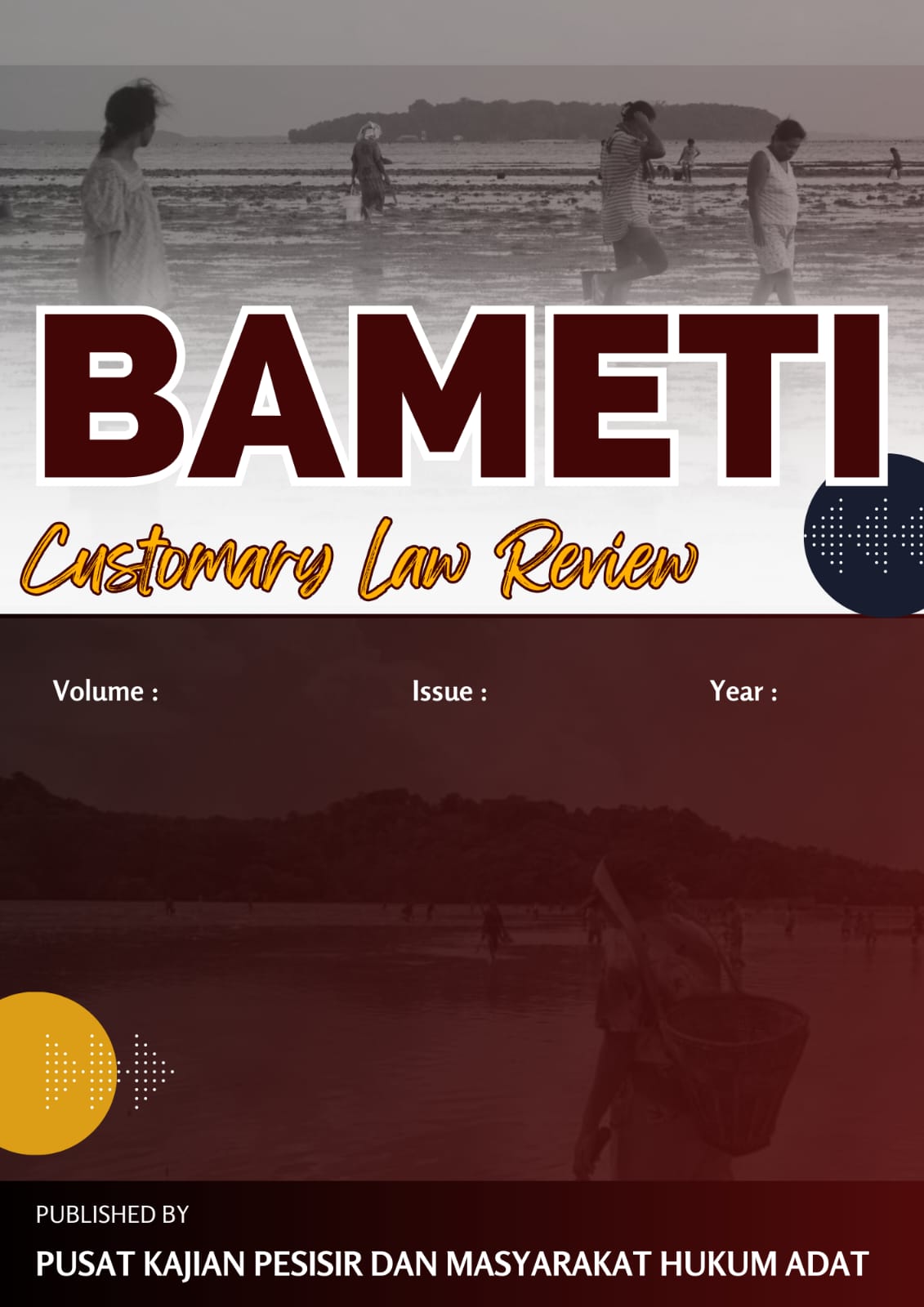Fungsi Kewang Dalam Mencegah Abrasi Pantai Dan Kerusakan Lingkungan Wilayah Pesisir Negeri Adat
Abstract
The kewang institution not only functions as a guardian of ecological balance but also as a protector of the customary land rights of indigenous communities concerning natural resource management. In Central Maluku, kewang plays a crucial role in regulating access, utilization, and conservation of marine life and forests, involving the mechanism of sasi or prohibitions that must be adhered to by the local community. With deep roots in local cultural values, kewang has a clear organizational structure and the authority to enforce customary laws, including prohibitions and sanctions for violators. Kewang plays a key role in maintaining a harmonious relationship between humans and nature while encouraging the community to take responsibility for the sustainable use of natural resources. Through this role, indigenous communities in Central Maluku strive to preserve traditions and local knowledge that have existed for generations. Therefore, understanding and preserving the kewang institution is vital in efforts to maintain cultural identity and environmental sustainability in the region.
Downloads
References
Abdulrahman, Hukum Adat Menurut Perundang-undangan Republik Indonesia. Jakarta: Cendana Press, 1984.
A. Suriyaman Mustari Pide. Hukum Adat: Dahulu, Kini, dan Akan Datang. Jakarta: Penerbit KENCANA, 2015.
Aartje Tehupeiory. Peran Lembaga Adat Dalam Penyelesaian Sengketa Hak Ulayat Di Negeri Soahuku - Amahai Maluku Tengah. Jakarta: UKI PRESS, 2019.
Ekberth Vallen Noya. "Sasi Labuang (Petuanan Negeri) sebagai Bentuk Perlindungan Terhadap Biota Laut Di Negeri Adat." BAMETI Customary Law Review 1, no. 2 (2023): 83-93. E-ISSN: 2988-778X.
Frank Cooley. Mimbar dan Takhta. Jakarta: Pustaka Sinar Harapan, 1987.
Hazairin. Demokrasi Pancasila. Jakarta: Tintamas, 1970.
Hilman Hadikusuma. Pokok-Pokok Pengertian Hukum Adat. Bandung: Alumni, 1980.
Husen Alting. Dinamika Hukum Dalam Pengakuan Dan Perlindungan Hak Masyarakat Hukum Adat Atas Tanah. Yogyakarta: LaksBang PRESSindo, 2010.
H. R. Otje Salman Soemadiningrat. Rekonseptualisasi Hukum Adat Kontemporer. Bandung: Alumni, 2002.
Jamanat Samosir. Hukum Adat Indonesia. Medan: Nuansa Aulia, 2013.
J.K. Matuankotta. "Negeri Dalam Bingkai Masyarakat Hukum Adat Di Maluku." Jurnal Sasi 11, Fakultas Hukum Universitas Pattimura, Ambon, 2005
Marhaeni Ria Siombo dan Henny Wiludjeng. Hukum Adat Dalam Perkembangannya. Jakarta: Universitas Katolik Indonesia Adma Jaya, 2020.
Oemar Moechthar. Perkembangan Hukum Waris: Praktik Penyelesaian Sengketa Kewarisan di Indonesia. Jakarta: Prenadamedia Group, 2019.
Pemerintah Provinsi Maluku. Penjelasan Bagian Ketentuan Umum, Peraturan Daerah Provinsi Maluku Nomor 16 Tahun 2019 Tentang Penataan Desa Ada.
Soepomo. Hukum Adat. Jakarta: Pradnya Paramita, 1993.
Sri Warjiyati. Ilmu Hukum Adat. Yogyakarta: Deepublish, 2020.
Tolib Setiady. Intisari Hukum Adat Indonesia dalam Kajian Kepustakaan. Bandung: Alfabeta, 2015.
Copyright (c) 2025 Ekberth Vallen Noya (Author)

This work is licensed under a Creative Commons Attribution-NonCommercial 4.0 International License.
Authors who publish their manuscripts in this Journal agree to the following conditions:
- The copyright in each article belongs to the author, as well as the right to patent.
- Authors are able to enter into separate, additional contractual arrangements for the non-exclusive distribution of the journal's published version of the work (e.g., post it to an institutional repository or publish it in a book), with an acknowledgment of its initial publication in this journal.
- Authors are permitted and encouraged to post their work online (e.g., in institutional repositories or on their website) prior to and during the submission process, as it can lead to productive exchanges, as well as earlier and greater citation of published work.
- Authors have the right to self-archiving of the article (Author Self-Archiving Policy)













